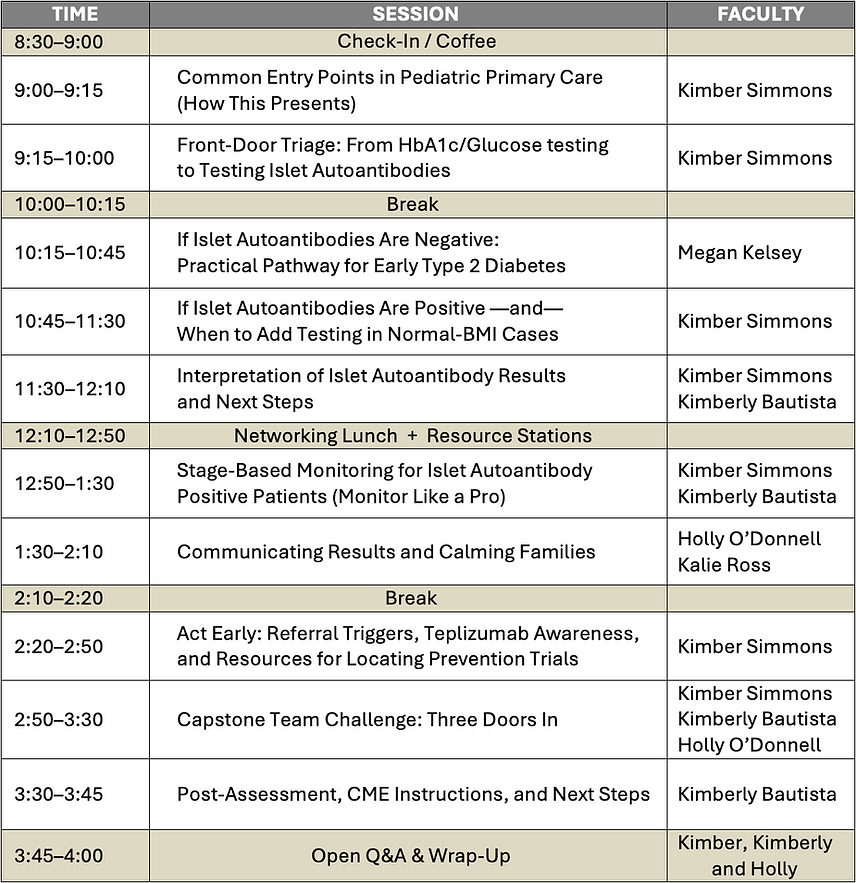Why Attend?
Most children who develop type 1 diabetes (T1D) show no warning signs—until diabetic ketoacidosis strikes. This fast-paced, evidence-rich course equips pediatricians with the latest tools to spot the silent stage of T1D, differentiate it from early type 2, and act before an emergency unfolds.
What You'll Gain (in just one day!)
Screen Smarter: Pinpoint who needs screening, when to test, and how to order and interpret islet-autoantibody panels with confidence.
Diagnose Confidently: Differentiate an elevated HbA1c caused by emerging T1D from early T2D and lay out the right care pathway for each.
Monitor Like a Pro: Apply age- and stage-based follow-up protocols that keep families safe, informed, and out of the ICU.
Act Early: Recognize referral triggers, determine teplizumab eligibility, and guide families to trusted resources for locating and enrolling in T1D-prevention trials.
Communicate Effectively:
Use ready-to-go scripts to deliver positive antibody results and ease caregiver anxiety.
...and Keep Learning: Gain ongoing access to the Ask the Experts online community, down-loadable tools, and six monthly case-based sessions after the course.
Course Highlights
01
Interactive case workshops—real-world scenarios you’ll see in clinic next week
02
Role-play on breaking high-impact news to caregivers
03
Flowcharts and handouts for immediate use
04
Pre/Post knowledge checks to prove your progress
05
CME credits | Participants may earn up to 11.75 CME credits (LIVE event plus 6 monthly sessions)
The University of Colorado School of Medicine is accredited by the Accreditation Council for Continuing Medical Education (ACCME) to provide continuing medical education for physicians.
The University of Colorado School of Medicine designates this live activity for a maximum of 11.75 AMA PRA Category 1 Credits.™ Physicians should claim only the credit commensurate with the extent of their participation in the activity.
Learning Objectives
-
Identify current screening guidelines and risk factors to identify individuals at increased risk for developing type 1 diabetes.
-
Explain the appropriate use and interpretation of autoantibody testing and other diagnostic tools for confirming early-stage T1D.
-
Identify the differences in clinical presentation, laboratory findings, and progression between early type 1 and early type 2 diabetes to support accurate diagnosis.
-
Identify effective strategies for monitoring at-risk or pre-symptomatic patients in primary care, including the use of CGM and OGTT results.
-
Identify opportunities for collaboration among primary care providers and specialist providers.
Featured Speakers
Dr. Kimber Simmons, MD, MS
Associate Professor
Dr. Megan Kelsey, MD, MS
Professor
Dr. Holly O’Donnell, PhD
Assistant Professor
Dr. Kalie Ross, PhD
Director of Psychology
St Peter’s Health Hospital System
AGENDA


